Lea Wait's Blog, page 62
June 9, 2023
Weekend Update: June 10-11, 2023
 Next week at Maine Crime Writers there will be a Crime Wave report (Monday) and posts by Kaitlyn Dunnett/Kathy Lynn Emerson (Tuesday), Jule Selbo (Thursday), and Dick Cass (Friday).
Next week at Maine Crime Writers there will be a Crime Wave report (Monday) and posts by Kaitlyn Dunnett/Kathy Lynn Emerson (Tuesday), Jule Selbo (Thursday), and Dick Cass (Friday).
In the news department, here’s what’s happening with some of us who blog regularly at Maine Crime Writers:
Matt Cost will be moderating a panel at the Maine Crime Wave, Love & Death: Writing Romantic Suspense, on Saturday, June 10th, at the USM Glickman Library. The panel will consist of rock stars Paul Doiron, Carla Neggars, Susan Stoker, and Susan Vaughan.
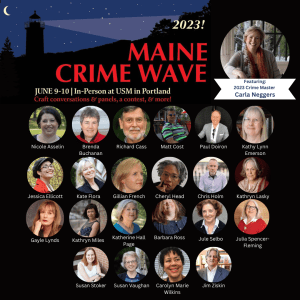
An invitation to readers of this blog: Do you have news relating to Maine, Crime, or Writing? We’d love to hear from you. Just comment below to share.
And a reminder: If your library, school, or organization is looking for a speaker, we are often available to talk about the writing process, research, where we get our ideas, and other mysteries of the business, along with the very popular “Making a Mystery” with audience participation, and “Casting Call: How We Staff Our Mysteries.” We also do programs on Zoom. Contact Kate Flora
This Old House
In a previous life, I was the Antique and Vintage Properties Manager at a real estate company in Norwich, Connecticut. Home to Benedict Arnold and lots of other famous and less seditious Revolutionary War folks, the city is a treasure-trove of fabulous old colonial houses.
I think I fell into the job since my husband and I once tied to rehab a mid-1800s farmhouse on 20+ acres on a dirt road in Garland, Maine. We never finished. At the time, we lived smack in the middle of the Lee Academy campus, and the Garland place was a weekend/vacation respite and retreat, and maybe, we thought, a house to retire in.
Inside, there were hand-hewn beams, wide pine floorboards and a trap door to the boulder-lined cellar. Outside, a disgusting chicken coop insulated with cardboard cartons and a huge rotting barn contributed to the “gentleman’s farm” ambience. I had fun with a crowbar knocking down sagging ceilings (lots of acorns, newspapers, and a rat skeleton), painting kitchen cupboards, and wallpapering. My husband John tried his hand at plumbing, so consequently the cold water came out of the hot water tap and vice versa. He hooked up the collapsing lean-to to his truck and pulled it off the back of the house, filling in the fetid pond. (The transmission on the truck was really never the same after.) We didn’t know about the bad well and bats in the bedroom until we moved out.
Despite its obvious drawbacks, it was heaven for our kids when they were little. So much space to run around. The chicken coop got cleaned up and converted to JACS’ house, a playhouse named for the first initial of each of our kids—Jessie, Abigail, Christopher, and Sarah. They drew on the unpainted sheetrock in their rooms. (Chris’s brilliant contribution in crayon: Girls are stopid. So is Sarah.) There was a tire swing. We’d sit in the barn on a sprung leather couch and watch the garden grow. I made jams, jellies, syrups, pickles, and froze/canned vegetables. John estimated each bag of peas was worth about $25, after considering labor, fertilizer, and the price of the rototiller. A neighbor borrowed the fenced pasture for his sheep and horses, so we had the benefit of animals without the responsibility. To return the favor, he’d invite us to go in his haywagon in the evenings to watch the moon rise and count the stars.
We sold the house when we moved to Connecticut, and it’s been re-sold several times since. The latest iteration on Zillow crushed me—the interior is unrecognizable, although the exterior apparently has not been painted in the 40 years since we left. No more wide pine floorboards, but fake gray laminate ones. (There was a recent article in the New York Times about the ubiquitousness of gray floors—and walls and cabinets—and how they’re all pretty depressing.) The Home Comfort wood/gas combination stove is gone, where I once cooked the Thanksgiving turkey with wood when we ran out of bottled gas. The fireplace tiles I laid have disappeared, as has the fireplace (blocked up, but still with a lovely mantel) and the shelves next to it which held my brown and white transferware. There’s not a scrap of wallpaper left. I have to remind myself that tastes change when it comes to renovation, and publishing too.
Apparently, the contemporary cozy mystery market is completely overstuffed with quaint book shops, sassy sewing circles, candy makers and cupcake bakers, plus unlucky caterers who find a body in the bushes at every outdoor wedding. And according to the P & L folks, historical cozy mysteries just don’t make enough money to acquire. (This, of course, is my preferred lane. Just my usual luck.) However, thrillers and suspense books are selling like hotcakes.
Or cupcakes.
I get tense just looking at the covers. Blood spatters. Frenzied fonts. Someone, usually a female, is missing and probably dead or wishing she was. When they are optioned for movies, I have to close my eyes when the tell-tale ominous music starts. I do most of my viewing on my computer screen, and my hand is primed to cover it at the first sign of trouble. I am a cowardly person.
To everything there is a season. We’ve seen vampires and witches come and go and yo-yo back, and once-dead contemporary romance has resurrected itself with cutesy cartoon covers. Let’s dig out the crystal ball. What do you think the next publishing trend will be? What do YOU want to read? How do you feel about gray everywhere?

The oil tank at the front door is an “improvement.”
For more info on Maggie and her books, please visit www.maggierobinson.net
June 7, 2023
Seduced to the Natural World
 We need nature writing. We need it now more than ever: need to be seduced into the natural world: need to savor what remains or take direction toward finding new landscapes and experiences.
We need nature writing. We need it now more than ever: need to be seduced into the natural world: need to savor what remains or take direction toward finding new landscapes and experiences.  We need to manage the grief we feel when we lose a place and its wildlife—or be ready for the grief to come.
We need to manage the grief we feel when we lose a place and its wildlife—or be ready for the grief to come.
Barbara Kingsolver nails that one. “The final stages of grief. Dellarobia felt an entirely new form of panic as she watched her son love nature so expectantly, wondering if he might be racing toward a future like some complicated sand castle that was crumbling under the tide. She didn’t know how scientists bore such knowledge. People had to manage terrible truths.” (From “Flight Behavior”)
************
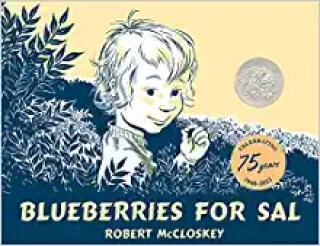 My first exposure to nature writing probably came from Blueberries for Sal.
My first exposure to nature writing probably came from Blueberries for Sal.
“On the other side of Blueberry Hill, Little Bear came with his mother to eat blueberries. ‘Little Bear,’ she said, ‘eat lots of berries and grow big and fat. We must store up food for the long, cold winter.’”

This is the view from Nancoweap. Anasazi granaries are carved into the wall here. This is a Powell expedition pic, but one of my favorite places.
But the first time I was literally immersed and awed by it, was reading John Wesley Powell’s original journals of his Colorado River while I spent twenty days rafting and hiking that river. I wrapped his journal in double baggies and a waterproof bag. It still got damp: huge waves there. I read it by headlamp with my toes in wet sand. The sound of rapids was so urgent and powerful, it felt like extra blood pumping through me. I was primed for his words.
original journals of his Colorado River while I spent twenty days rafting and hiking that river. I wrapped his journal in double baggies and a waterproof bag. It still got damp: huge waves there. I read it by headlamp with my toes in wet sand. The sound of rapids was so urgent and powerful, it felt like extra blood pumping through me. I was primed for his words.
I didn’t keep the diary I planned because Powell had painted the canyon’s wonders and perils so vividly, I was simply awed by his prose as well as the river and the canyon.
He writes, “The little valleys above are beautiful parks; between the parks are stately pine forests, half hiding ledges of red sandstone. Mule deer and elk abound; grizzly bears, too, are abundant; and here wild cats, wolverines, and mountain lions are at home. The forest aisles are filled with the music of birds, and the parks are decked with flowers. Noisy brooks meander through them; ledges of moss-covered rocks are seen; and gleaming in the distance are the snow fields, and the mountain tops are away in the clouds.”
From his Maine cabin Bernd Heinrich gives a deep dive on ravens.  He and his students lugged in carcasses and roadkill in order to get close enough to study them extensively. Bernd kept a low profile hiding in a blind he built, but he created the conditions to get close—very close— to the birds.
He and his students lugged in carcasses and roadkill in order to get close enough to study them extensively. Bernd kept a low profile hiding in a blind he built, but he created the conditions to get close—very close— to the birds.
We are partial to Henry David Thoreau’s “The Maine Woods” yet we do feel him in almost every line because the woods enters his pores before he pours it out. (Still love it.) “The spruce and cedar on its shores, hung with gray lichens, looked at a distance like the ghosts of trees. Ducks were sailing here and there on its surface, and a solitary loon, like a more living wave — a vital spot on the lake’s surface — laughed and frolicked, and showed its straight leg, for our amusement.”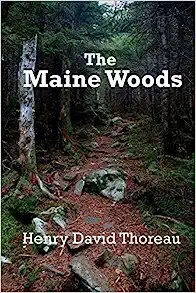
The woods also terrified him, (here after an unsuccessful Katahdin climb in bad weather.) “Here was no man’s garden, but the unhandseled globe. It was not lawn, nor pasture, nor mead, nor woodland, nor lea, nor arable, nor wasteland…Man was not to be associated with it. It was Matter, vast, terrific…rocks, trees, wind on our cheeks! the solid earth! the actual world!”
Maine can also lay claim to the brilliant and brave Rachel Carson. What must it feel like to have the entire corporate, industrial complex with its money and might come down on you? And congress, too? They all tried to destroy the fearless Carson who knew poison from her research lab to empty birds’ nests. She is credited with starting the modern environmental movement, all because birds could not hatch the next generation. She made it visible. She made it sing.
“Who has made the decision that sets in motion these chains of poisonings, this ever-widening wave of death that spreads out, like ripples when a pebble is dropped into a still pond? Who has placed in one pan of the scales the leaves that might have been eaten by the beetles and in the other the pitiful heaps of many-hued feathers, the lifeless remains of the birds that fell before the unselective bludgeon of insecticidal poisons? 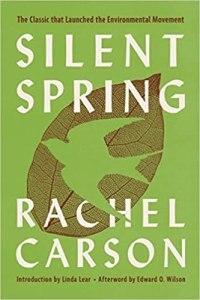 Rachel Carson “Silent Spring”
Rachel Carson “Silent Spring”
Like good nature writers who take us there, Carson took us first into nests so we could feel small bird lives—disappearing.
Wikipedia says, “Nature writing can be defined as non-fiction or fiction prose or poetry about the natural environment.”
Hmm. Not quite.
It seems most often (unless it’s a scientific research paper) the hand of humans—the human with its reactions and emotions— is woven (with skill) or interjected (narcissistically) into nature writing. Seems unavoidable if someone is going to share nature with us—report it out to us.
What about fiction? Sometimes nature illuminates fiction. Listen to Barbara Kingsolver fuse nature and character in one sentence. It’s just a phrase, but it takes us both to the power of the butterflies and also how Dellarobia was undone at the same time.
“The density of the butterflies in the air now gave her a sense of being underwater, plunged into a deep pond among bright fishes.”
“Flight Behavior” is an amazing novel: monarch butterflies against … pretty much the world. Nature is often an important character.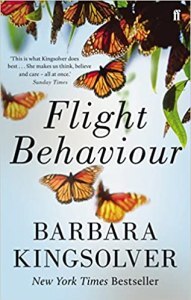
Writing stories from South Berwick, ME we have Sarah Orne Jewett (born 1849). “There’s sometimes a good hearty tree growin’ right out of the bare rock, out o’ some crack that just holds the roots’, she went on to say, ‘right on the pitch o’ one o’ them bare stony hills where you can’t seem to see a wheelbarrowful o’ good earth in a place, but that tree’ll keep a green top in the driest summer. You lay your ear down to the ground an’ you’ll hear a little stream runnin’. Every such tree has got its own livin’ spring; there’s folks made to match ’em.” “The Country of the Pointed Firs”
More recently Paul Doiron’s, “Hatchet Island” makes characters of the sea, the islands, and the birds who seek refuge there even as he intends to allow no refuge for a killer. “The wind was forecast to rise later, turning onshore in the afternoon, but so far, the air remained breathless. 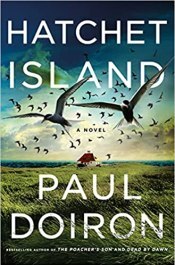 The sea was a sheet of hammered platinum. Every stir of my paddle brought the fecund smell of the ocean into my nose and mouth. It was as if I could taste the teeming life in the depths: the phytoplankton and the zooplankton, the oyster beds, the shoals of mackerel, and the deep-diving seals. The sensory stimulation left me feeling intoxicated.”
The sea was a sheet of hammered platinum. Every stir of my paddle brought the fecund smell of the ocean into my nose and mouth. It was as if I could taste the teeming life in the depths: the phytoplankton and the zooplankton, the oyster beds, the shoals of mackerel, and the deep-diving seals. The sensory stimulation left me feeling intoxicated.”
Good accurate, nature writing woven into fiction, gives readers genuine renditions of the natural world. It lends belief-power to whatever else might be fictional on the page. If the biology is accurate and rich and powerful and even insightful, why not accept the entire story as authentic and rich and powerful—even if the plot is fiction?
We fiction authors do a lot of nature-based research, even if it only lands as a few sentences. I asked the wolf coordinator for the National Wildlife Federation to proof my first novel for canine accuracy, and I found a wolf refuge where I could sit and watch wolves close up. David Mech’s book was my wolf bible.
David Mech’s book was my wolf bible.
Here’s the passage in “Deadly Trespass” where Patton (my narrator) meets one.
************
I smiled because the wolf seemed to be smiling at me, its mouth at a quizzical angle. Yellow-gold eyes calmly examined my face, holding my eyes. I’d never had an animal initiate a penetrating stare with see-everything eyes. Pock, sleeping heavily on my feet, brought me happy dog faces, not a searching interview. The wolf’s fur glowed with approaching daylight, patches of tan-white hair electrifying the black bristles that fluffed his cheeks. I’d seen dead wolf hair on Gordon. On this animal every hair breathed. Colors vibrated toward each other as he panted.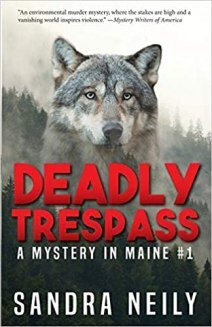
I thought his proportions made him male, but I couldn’t be sure. He was twice the size of any coyote that dodged my headlights. Two bold wipes of black hair crossed under his chin and plunged toward his legs. He looked like a bandit, cartridge belts slung over his chest, swaggering attitude on display. He yawned, curling black lips to show off incisors. My chance to see—close-up—three-inch fangs that could drop a moose, nose first. With liquid ease he slid saucer-sized front paws to the ground, leaned his head on them, and considered me from a level perspective. Stretched before my tent he was almost as long as my five-and-half-feet of tall.
************
Please do share out good stuff to others! I shared this Margaret Renkl piece with neighbors who leave outside lights on all night. Now, we are planning a firefly backyard gathering. Opinion | ‘Why Do You Still Have Lightning Bugs? Ours Are All Gone.’ – The New York Times (nytimes.com) “Firefly populations have dropped alarmingly, and it’s mostly our fault. Light pollution interrupts the flash patterns that fireflies use to communicate, making it more difficult to find a mate and evade predators. Development means the loss of the leaf litter and fallen branches and high grass that make up firefly habitat. …” (Renkl is the author of the acclaimed “Late Migrations: A Natural History of Love and Loss.”
American nature writing history reaches back to Spanish explorers and Columbus, but apparently women had not yet been pulled from someone’s rib so they didn’t exist in this summary. I offer up Willa Cather (born 1873).
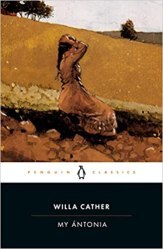 “… burning summers when the world lies green and billowy beneath a brilliant sky, when one is fairly stifled in vegetation, in the color and smell of strong weeds and heavy harvests; blustery winters with little snow, when the whole country is stripped bare and gray as sheet-iron. We agreed that no one who had not grown up in a little prairie town could know anything about it. … “My Antonia” (1918)
“… burning summers when the world lies green and billowy beneath a brilliant sky, when one is fairly stifled in vegetation, in the color and smell of strong weeds and heavy harvests; blustery winters with little snow, when the whole country is stripped bare and gray as sheet-iron. We agreed that no one who had not grown up in a little prairie town could know anything about it. … “My Antonia” (1918)
Finally, enjoy this fabulous (and inclusive) nature writing list of books. (Don’t miss “Refuge” by Terry Tempest Williams.)
Sandy’s debut novel, “Deadly Trespass, A Mystery in Maine” won a national Mystery Writers of America award, was a finalist in the Women’s Fiction Writers Association “Rising Star” contest, and was a finalist for a Maine Literary Award. The second Mystery in Maine, “Deadly Turn,” was published in 2021. Her third “Deadly” is due out in 2023. Find her novels at all Shermans Books (Maine) and on Amazon. Find more info on Sandy’s website.
June 6, 2023
When AI Bites you in the Assets
John Clark with an expanded look at the evolution of selling books online. First some background. I started selling used books online when I was the librarian in Hartland in order to create a revenue stream for collection development. I sold on Amazon and it was a pretty simple and straightforward process: Provide a condition and an accurate description, add a price, and activate the list. It was a great way to raise funds to buy more books and develop a DVD collection.
After several years of doing so, I realized I knew enough about what sold for decent money so I could go to a library book sale and buy items that would sell well online. My library initiative became a new hobby, particularly once I retired. The challenge of finding treasures at book sales also gave me the same thrill as the one I experienced when opening a treasure chest in a computer role-playing game.
Remember when everyone was talking about banks being too big to fail? Well we know how well that turned out. Amazon seems headed in a similar direction and it’s because it’s too big to operate intelligently any more. Bots, those little kernels of AI, run more and more of its operations every day.
That once straightforward process of listing a book/DVD/Cd has now become extremely frustrating. Many of the books I’ve tried to list on Amazon in the past year have resulted in a message to the effect that I am not authorized to sell this refurbished item, and there is no option to appeal. Trying to get in contact with a real human is equally elusive, and what, exactly, is a refurbished book?
The latest crisis is this ominous message many sellers have found at the top of their seller page: Your account is at risk of deactivation. To comply with the INFORM Consumers Act, which goes into effect on June 27, 2023, Amazon needs to collect and verify information about your Selling on Amazon account. Currently, you have one or more verification action items pending. Please review the list below and visit the Seller Account Information page to start verification.
I discovered it a couple weeks ago. When I go to find out what is needed to remedy the situation, I can find nothing that needs to be corrected. I’m not alone in trying to deal with the problem. It’s been a hot topic in the seller forum.

I wouldn’t be so unhappy if getting in contact with a human being was viable, but Amazon’s reliance on bots makes this a near impossibility. I don’t feel optimistic about my future selling prospects on their site.
What does this leave for options? I could invest a lot of time and money in joining something like ABE Books, of create my own store front, but since we’re talking a couple thousand in gross annual sales, such an option doesn’t make sense.
Instead, I’m listing and selling more on ebay. I’ve been a member there for more than thirty years, initially as a buyer, but more recently as a seller. I’m listing my reasons why below.
1-I can list almost anything, if I can describe it accurately. Years ago, my late mother-in-law gave me a musty coyote hide her father had trapped in the 1950s. She said it was probably something destined for the trash heap…I sold it on ebay to a lady in San Jose, CA for $10.50. My digital camera, coupled with my library cataloging skills, make listing an item accurately pretty easy. Items that are not being offered for sale anywhere online can be listed. I just sold Records of the Past Exploration Society Volumes 1-6 1902-1907 Ex-reference Collection, on commission for a local library. While individual volumes were listed on some sites, multiple ones were not for sale anywhere.

2-I’ve been a member long enough so I can list 250 items a month without having to pay an insertion fee.
3-Unlike Amazon, I can choose to sell by auction, or as buy it now, and determine whether I want to offer free shipping, or charge a realistic fee. I have a media mail chart, so I generally choose to sell an item as ‘buy it now’ with an accurate shipping rate.
4-I can see exactly what an item has been sold for before choosing to list anything. I do this by searching for the book, CD, DVD, etc. and then checking the sold box. This shows me whether any have sold in the last few months and for how much. If none have, or the price was so low trying to sell mine isn’t viable, I move on to another item.
5-I can see which items have been viewed and how many times. Likewise, I can see which ones are being followed. If an item hasn’t been looked at after twenty-five days, I end the listing and add a new one. Items I think might sell if up longer than thirty days automatically renew.

6-Prospective buyers can make an offer. I then have the option to accept it, or make a counter offer. If someone is interested in multiple items, I can combine shipping costs to make them a better deal.
7-Funds are deposited in my checking account monthly.
Is selling online for everyone? No, but it makes for an interesting and profitable way for me to stay busy and intellectually stimulated in retirement.
June 5, 2023
It’s Amazing Who You Run Into In Maine
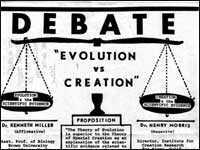
It’s amazing who you run into during the course of your regular life. Last week I met an elderly gentleman who casually told me that had a book coming out soon. When I asked what his book was about, he told me it was a book about his life and field of study. After telling me his name, I looked him up and discovered that he’s one of the world’s most famous philosopher. But he is so much more than a philosopher. He’s a neuroscientist and evolutionary biologist who studies consciousness, evolution and artificial intelligence. In fact, he’s beloved figure among Silicon Valley techies.
I immediately purchased one of his books and started reading it. It’s powerful and deep, and very dense. The author makes a compelling case for the evolutionary design theory, believing that life forms adapted throughout the millions of years they were allowed to develop. And while he admits that humans are intelligent designs, he steadfastly argues against an Intelligent Designer—a god if you will. He claims that organisms had “all the time in the world” to develop into what we’ve become today.
It got me to thinking about how this difficult subject relates to writing a novel. It’s a pantser versus plotter argument. Or evolutionary process versus intelligent design. The pantser adapts and changes on the fly in order to create their compelling characters. Unnecessary plot elements fall by the wayside while the good material gets stronger and stronger. The pantser reacts to situations and creates on the fly. The plotter, on the other hand, is more like an Intelligent Designer. There is a well-thought out pattern to their well-constructed plot. Everything moves according to teology. Everything has a purpose that helps drive the plot. The plotter knows where all this will end because he designed it.
Although it’s difficult to argue against the ideas this Maine philosopher is making in his book, I still fall on the side of their being an Intelligent Designer to what we call life. I think the two theories can coexist. Who created the universe? And made all the rules of physics that makes up everything.
Dennis Dennett is a giant in his field. What a surprise to learn that he lives in Cape Elizabeth. This after many years teaching at Tufts University. After reading his book, I have so many questions to ask him if I ever run into him again. If you get a chance, look him up. Or better yet, read his book and see which side of the debate you fall on. Are you a pantser when it comes to the world we live in? Or are do you think all this has been plotted out?

June 2, 2023
Weekend Update: June 3-4, 2023
Next week at Maine Crime Writers there will be posts by Joe Souza (Monday), John Clark (Tuesday), Maggie Robinson (Thursday), and Sandra Neily (Friday).
In the news department, here’s what’s happening with some of us who blog regularly at Maine Crime Writers:
Coming soon (June 9-10): Maine Crime Wave! Lots of Maine Crime Writers will be there.

For more information, click here: https://www.mainewriters.org/maine-crime-wave
Matt Cost will be doing a reading Friday night at the Crime Wave (above) and moderating a panel on Saturday afternoon on Romantic Suspense. He will also be doing a book talk on Friday, June 9th, at the South Freeport Congregational Church at 11:30 a.m.
98 S Freeport Rd, South Freeport, ME, United States, Maine
An invitation to readers of this blog: Do you have news relating to Maine, Crime, or Writing? We’d love to hear from you. Just comment below to share.
And a reminder: If your library, school, or organization is looking for a speaker, we are often available to talk about the writing process, research, where we get our ideas, and other mysteries of the business, along with the very popular “Making a Mystery” with audience participation, and “Casting Call: How We Staff Our Mysteries.” We also do programs on Zoom. Contact Kate Flora
Oh this glorious, glorious spring!
Emily Dickinson (1830-1886)
A little Madness in the Spring
Is wholesome even for the King,
But God be with the Clown –
Who ponders this tremendous scene –
This whole Experiment of Green –
As if it were his own!
Kate Flora: Recently someone said that if your gardens don’t look good in May, they’ll

It’s a splendid year for lilacs
never look good. I don’t know if this is true. A visit to the Coastal Maine Botanical Gardens at any season is an experience filled with delight. But yes, right now my gardens are looking quite wonderful, despite all the losses caused by winter weather. They present a dilemma which must be common to all writers: how can we stay at our desks, toiling away on our books, when the world so adamantly wants us to come outside?
In my more disciplined years, I would make deals with myself: I was allowed to garden for an hour early in the day, before it got hot, and for the rest of the day, I was chained to my desk. Sometimes, when I was deeply in story but the gardens needed attention, it would be a ten hour day with two hours allowed in the garden. Once, when I was late, I confess that I was out there gardening in my nightgown, and got a nasty spider bite.
Recently, I have found that I lack the energy and the discipline to work at either gardening or writing for as long. Since the mosquitoes have come out in force. I figure that if I’m going to wear my tick and mosquito repellant clothes and spray myself, I might as well stay out there longer. After so many years at the keyboard, I do have faith that books will get done, just more slowly. As for the gardens? I never get the work done and I expect I never will.
 At times in the past, I’ve blogged about how gardening is like writing a book. You have to take a lot on faith–that that inspiring idea will, if nurtured, grow into a novel, just as that teeny shrub, if nurtured, will one day be a gorgeous bush buzzing with bees. Organizing the colors and textures and heights of plants is also a lot like telling a story. Words, like plants, have to be chosen to best illuminate the story, make the characters come alive, or move the action along. And as with writing a book, when you’re working on one patch at a time, you cannot see the whole, yet you have to have faith it will come together in the end.
At times in the past, I’ve blogged about how gardening is like writing a book. You have to take a lot on faith–that that inspiring idea will, if nurtured, grow into a novel, just as that teeny shrub, if nurtured, will one day be a gorgeous bush buzzing with bees. Organizing the colors and textures and heights of plants is also a lot like telling a story. Words, like plants, have to be chosen to best illuminate the story, make the characters come alive, or move the action along. And as with writing a book, when you’re working on one patch at a time, you cannot see the whole, yet you have to have faith it will come together in the end.
The way that writers see the world is a subject I return to fairly often, as you faithful readers may have noticed. During this season, I love watching the tiny shoots of green grow taller every day until they become large, lush plants with the promise of flowers ahead. I prowl along the edge of the perennial bed, looking for those tiny volunteers that have escaped and are trying to survive in the grass of the lawn. I dig them up and find them new places to grow.
What do these shoots of green that seem to change overnight teach me? Perhaps about

Forty years ago, this was a tiny shrub. And I was writing my first mystery
how this is much like the way a book begins. First it is just a tiny idea, and by pondering on it, it gradually grows to become the plot of a book. Like those tiny shoots, a book idea will need attention. It will need to be fertilized with essential questions like: What is this about and why is this book about this particular set of characters? It will need space to grow to it’s full size, in the brain and on the page. It will need the unnecessary ideas to be weeded out so that the plant can grow. Sometimes it will need to be cut back to make the plot fuller and less straggly.
Like a tender plant needing a gardener to tend it, a book idea needs the author to figure out what the story needs to make it grow into a successful book. What will fertilize it? How much water (or perhaps, in an authors case, how much alcohol, or time, or sweat) will it need to make it grow and achieve its full potential? What kind of research must be done to make the setting, characters, and plot feel authentic to a reader. And as in a successful garden, the plant, like a protagonist or antagonist, will need complimentary plants around it to illuminate it and compliment it. What complimentary shapes and sizes and colors will enhance a perennial bed? What sidekicks, bosses, clients, or love interests will shape and enhance your protagonist? What plants, like antagonists, may need to be managed so they don’t dominate?
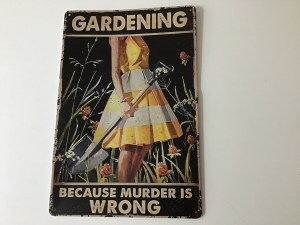
A most appropriate Mother’s Day gift
And of course, as in any garden there will be the weeds, roots, rocks, and pests, that will want to thwart successful growth to a mature plant, in a book there will be the obstacles internal and external, and the antagonists, both natural and human, which must be overcome in order for the story to come to a successful conclusion where order is restored to the world.
Finally, like a well-told story that is coming to its conclusion, there is the moment in the garden when that plant has been successfully fertilized, watered, and protected from weeds and insects, and it fulfills its purpose by producing colorful leaves and glorious flowers. With the book, that is the moment when the writer types: The End, and sits back with a smile of satisfaction.
Of course, just as in a well-tender garden, the job isn’t finished. Plants need to be divided, cut back, or shuffled around to new locations. In the book, typing: The End is not the end. It is simply the beginning of the next process–revision.
May your words flow and your garden grow!
May 31, 2023
Print or E-Book? (and a giveaway)
Kaitlyn Dunnett/Kathy Lynn Emerson here with a question for readers of this blog. No, I’m not going to ask you which you prefer, print copies or e-books. Not in general, anyway. My query has to do with only one type of book—nonfiction, specifically reference books.
 I gather you can make notes in an e-book, but for many people a print copy with post-it notes sticking out and parts highlighted in blinding yellow and handwritten notes in the margins, is still the only way to go. I have written nonfiction as well as fiction and two of those books, How to Write Killer Historical Mysteries and The Writer’s Guide to Everyday Life in Renaissance England from 1485-1649 are reference books for writers. Both are out of print in all but e-book editions, and in the case of the latter, written as part of the Writer’s Digest Everyday Life series, the e-book is not much more than a pdf file. It was produced for the e-book market way back in 2004—eons ago in tech terms. Officially priced at $10, most online sellers offer it for less—as low as $4.99—and it has sold at least a few copies every month since it was issued.
I gather you can make notes in an e-book, but for many people a print copy with post-it notes sticking out and parts highlighted in blinding yellow and handwritten notes in the margins, is still the only way to go. I have written nonfiction as well as fiction and two of those books, How to Write Killer Historical Mysteries and The Writer’s Guide to Everyday Life in Renaissance England from 1485-1649 are reference books for writers. Both are out of print in all but e-book editions, and in the case of the latter, written as part of the Writer’s Digest Everyday Life series, the e-book is not much more than a pdf file. It was produced for the e-book market way back in 2004—eons ago in tech terms. Officially priced at $10, most online sellers offer it for less—as low as $4.99—and it has sold at least a few copies every month since it was issued.
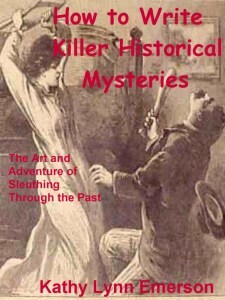 How to Write Killer Historical Mysteries: The Art and Adventure of Sleuthing Through the Past won the 2008 Agatha Award for mystery nonfiction and has been available in a trade paperback edition until last year when Perseverance Press, the publisher, closed its doors. I made a few updates (the marketing section, obviously, was completely out of date) and issued a new e-book edition last year. I thought about also self-publishing a print-on-demand paperback version but put that on hold. After all, there were still plenty of copies of the Perseverance paperback floating around. Now I’ve started thinking about it again. As for the e-book, which sells for $4.99, it has had some bumps. There is no Kindle edition because Amazon bots deemed it was available elsewhere for free. Where? I have no idea, but they say their decision is final. B&N, Apple, Kobo, and others are not so short-sighted. A print edition would be listed on Amazon, although Amazon would probably (based on my previous experiences) make it as difficult as possible to actually order a copy.
How to Write Killer Historical Mysteries: The Art and Adventure of Sleuthing Through the Past won the 2008 Agatha Award for mystery nonfiction and has been available in a trade paperback edition until last year when Perseverance Press, the publisher, closed its doors. I made a few updates (the marketing section, obviously, was completely out of date) and issued a new e-book edition last year. I thought about also self-publishing a print-on-demand paperback version but put that on hold. After all, there were still plenty of copies of the Perseverance paperback floating around. Now I’ve started thinking about it again. As for the e-book, which sells for $4.99, it has had some bumps. There is no Kindle edition because Amazon bots deemed it was available elsewhere for free. Where? I have no idea, but they say their decision is final. B&N, Apple, Kobo, and others are not so short-sighted. A print edition would be listed on Amazon, although Amazon would probably (based on my previous experiences) make it as difficult as possible to actually order a copy.
Anyhoo, I could do print-on-demand trade paperback editions of both these books that could be ordered online or through any bookstore or library or direct from me. I probably will, but I have other reprint projects in the works. I have to wonder if that many people really care if they have a reference book in a paperback edition.
Producing a print-on-demand version of either book wouldn’t be all that difficult. I’ll have to proofread the text again, but there shouldn’t be much that needs changing. Formatting is fairly simple thanks to the company (Draft2Digital) I use to produce my self-published books. They provide ISBNs and generate a table of contents. I just have to be consistent about spacing, font size, and so on in the text. Nitpicky stuff. It can be time-consuming, though. The templates are great but they are set up for fiction and tend to indent in the wrong places or start new pages where you don’t want them to. It usually takes me several tries, making corrections in the manuscript and resending it, before everything comes out looking the way it should.
 I already have a front cover for the e-book of the How To, so all I need is the copy for the back cover. However, I will need an entirely new cover for the Writer’s Guide and will need to update the frontmatter, including adding an author note.
I already have a front cover for the e-book of the How To, so all I need is the copy for the back cover. However, I will need an entirely new cover for the Writer’s Guide and will need to update the frontmatter, including adding an author note.
I was considering all those things and thinking This won’t be too hard when I remembered something. E-books are searchable. Print books are not. Each of these books originally had an index. The entries can be reused but the page numbers will no longer match. After everything else is good to go, I’m going to have to go through every dratted index entry, find the correct page numbers, insert them in the manuscript, resend it, and hope the spacing looks right when I’m done.
Good grief.
I need to do it right, too, because by the time I add in production costs per book and the cut Draft2Digital gets (both non-negotiable), these paperbacks will have to be priced almost as high as if they were traditionally published. Probably $15.99—so as much as triple what the e-book would set a buyer back.
The templates aren’t fond of bibliographies, either.

e-book cover
On the bright side, I can add back the illustrations from the original Writer’s Guide, since I own them. I added out-of-copyright illustrations when I reissued my juvenile biography of Nellie Bly and it came out really well.
So, at long last, here is my question, in multiple parts: Do you prefer print to electronic for nonfiction? Do you give up if it looks like there will be a wait to get a print copy of the book? How much more are you willing to pay for a print copy over an e-book?
Thanks in advance to everyone who weighs in on this issue in the comments section. I’m giving away a free paperback of the Perseverance Press (2008) edition of How to Write Killer Historical Mysteries to one of you. The drawing for the winner works this way: after three days (on June 4), the names from the comments on this post will be written on pieces of paper that are then crumpled and strewn on the floor. The one Shadow pounces on first will get the book. If I have your email address, I’ll contact you. If I don’t, you’ll have to check back here (in the comments) to find out if you’ve won. Best of luck to you all.

Kathy Lynn Emerson/Kaitlyn Dunnett has had sixty-four books traditionally published and has self published others, including several children’s books. She won the Agatha Award and was an Anthony and Macavity finalist for best mystery nonfiction of 2008 for How to Write Killer Historical Mysteries and was an Agatha Award finalist in 2015 in the best mystery short story category. She was the Malice Domestic Guest of Honor in 2014. Her most recent publications are The Valentine Veilleux Mysteries (a collection of three short stories and a novella, written as Kaitlyn) and I Kill People for a Living: A Collection of Essays by a Writer of Cozy Mysteries (written as Kathy). She maintains websites at www.KaitlynDunnett.com and www.KathyLynnEmerson.com.
May 30, 2023
Maine Literary Award winner Kathryn Lasky on Switching Genres
From time to time, we like to introduce new Maine authors to our readers. Today we’re delighted to share a post by this year’s Maine Literary Award winner for Crime Fiction, Kathryn Lasky.
Pitch: What happens when a well-known children’s book author switches genres after decades of writing fantasy and historical fiction for middle grade and young adult readers? Kathryn Lasky the award-winning children’s book author is doing just that. As the author of Guardian of Ga’Hoole the New York Times bestselling series that was turned into a Warner Brothers film The Legend of The Guardians directed by Zack Snyder, she is now writing an adult mystery Light on Bone. The story is set in New Mexico and features Georgia O’Keeffe as an amateur sleuth. This latest mystery of Lasky’s recently won the the Maine Literary Award for Crime Fiction.
Kathryn Lasky: The first thought that often comes to some people’s minds might be,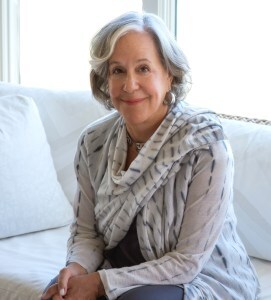 ‘Wow now you can write about characters who drink, have sex and swear.” True but there is a lot more that makes it very different. The fundamental difference is the perspective and that is what I find most fascinating. When I’m writing children’s books and I am in the mind of say a middle grade kid I have this sort of inner eleven year old that I am filtering things through, or if it’s a YA book an inner teenager. In either case, the perspective is always looking forward to what the possibilities of the years, the life ahead might be. It’s a soft yearning for the future, for power, for independence that subtly colors all. Such is not the case when I’m writing an adult mystery as the protagonist is all grown up.
‘Wow now you can write about characters who drink, have sex and swear.” True but there is a lot more that makes it very different. The fundamental difference is the perspective and that is what I find most fascinating. When I’m writing children’s books and I am in the mind of say a middle grade kid I have this sort of inner eleven year old that I am filtering things through, or if it’s a YA book an inner teenager. In either case, the perspective is always looking forward to what the possibilities of the years, the life ahead might be. It’s a soft yearning for the future, for power, for independence that subtly colors all. Such is not the case when I’m writing an adult mystery as the protagonist is all grown up.
In the case of Light On Bone set in 1934, the protagonist, Georgia O’Keeffe is in her late forties and as with many of us—who like myself are well beyond our forties—our perspective is often looking back. Back to what could have been, might have happened and yes, how much time do we have left to do it. Time is finite for us, for the characters in an adult book. Time is rarely finite for the central characters of a children’s book. And because children are young, they don’t have as many regrets as an older character, but perhaps a bit more hope. However on the brighter side there is the possibility of renewal. So that in a nutshell is the significant difference between writing for kids and writing for grownups.
And it was renewal that drove Georgia O’Keeffe to the southwest desert in 1934. She had been to New Mexico before but it is the first time she had ever gone to the Ghost Ranch. The ranch would become her residence for six months of the year until she restored a house in the nearby town of Abiquiu more than a decade later.
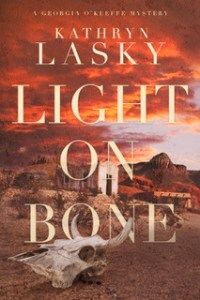 When Georgia arrived at the Ghost Ranch in 1934 she was fragile and almost broken. She had spent three months in a psychiatric hospital in New York following a complete nervous breakdown after her husband Alfred Stieglitz’s very public affair with Dorothy Norman, a wealthy heiress. It was not simply his infidelity; she had been forced by Stieglitz to have an abortion a few years before. Adding to her misery she had been commissioned to do mural for Radio City Music Hall that been a disaster. The wall for the mural had been poorly prepared and began to disintegrate before she had finished the mural. Somewhat ironically, during this period she was approaching the peak of her career and had just sold a painting for an unheard of sum of money. She had fled to the southwest and found herself rejuvenated.
When Georgia arrived at the Ghost Ranch in 1934 she was fragile and almost broken. She had spent three months in a psychiatric hospital in New York following a complete nervous breakdown after her husband Alfred Stieglitz’s very public affair with Dorothy Norman, a wealthy heiress. It was not simply his infidelity; she had been forced by Stieglitz to have an abortion a few years before. Adding to her misery she had been commissioned to do mural for Radio City Music Hall that been a disaster. The wall for the mural had been poorly prepared and began to disintegrate before she had finished the mural. Somewhat ironically, during this period she was approaching the peak of her career and had just sold a painting for an unheard of sum of money. She had fled to the southwest and found herself rejuvenated.
The narrative begins when she discovers the slain body of a priest in the desert. More murders follow. And there is a burgeoning romance between Georgia and the local sheriff. Add to this mixture an international espionage plot involving Charles Lindbergh (who is staying at the ranch with his wife Anne). And then more bodies turn up ultimately resulting in an unforeseen denouement. Of course, the object as with any mystery is to figure out who did it. That is the whole point of mystery fiction and that differs vastly from the point of children’s novels, unless they are mysteries as well. Children’s novels are more often focused on just getting through life, and not simply avoiding murder.
Solving a crime in a mystery seems easier to me than arriving at a resolution in a children’s book. But this is not what motivated me to go back to mysteries. Yes, almost thirty years ago I had written the Calista Jacobs mysteries series. The central character was in fact a children’s book illustrator. It was fun because I knew a lot about that world. The character was very similar to me—her physical appearance, her sense of humor, her situation. She was a mom like me and her middle grade son play a sidekick role. She lived in a house just like mine, in the same city where I live Cambridge, Massachusetts. But when I stumbled across the idea for Light On Bone I could not have found a character more different from myself than Georgia O’Keeffe.
I had of course always loved O’Keeffe’s paintings but had not really done much research about her life. And I was going to have to. Nowadays I write a lot of animal fantasy for children and I have to do an enormous amount of research. People think ‘oh fantasy you just make it up, right’? Wrong! It’s not anything goes. Luckily I live very close to the Harvard Bio labs and the Harvard Natural History. For my children’s series, The Guardians of Ga’Hoole, that is as about a colony of owls, I spent many hours at Harvard which has one of the largest collections of dead owls anyplace! Yes it used to be legal to shoot them. Now most of the bodies come from disastrous collisions with trucks and cars. I needed to find about their anatomy, their feathers which are very complex, their hunting and mating habits. You just can’t make this stuff up even if it’s a fantasy book.
Well, I took the same approach to Georgia O’Keeffe –you just can’t make it up. You have to do the research. There was one gem of a fact that I discovered about O’Keeffe. She had an odd perceptual phenomenon known as synesthesia. For Georgia it was a blessing. For an amateur sleuth it would be as well. Synesthesia occurs when stimulation of one sensory, or cognitive pathway, leads to spontaneous experiences in a secondary pathway. Imagine, for example, when a person hears images and sees sound. Or as O’Keeffe herself put it in an interview: “You asked me about music. I like it better than anything in the world—color gives me the same thrill. . .” She could find the equivalents of color, shape, and imagery in music. She would sit and listen to music for hours. Her favorites were Haydn, Beethoven, Schumann, and Bach, as well as Gershwin.
Someone asked me if writing for adults requires the same willing suspension of disbelief as fantasy. It does not at all. Convincing people that an artist like Georgia O’Keeffe can pick up a clue like the glint of a coin in a low-angled sun striking something silver is not hard at all. Convincing a reader that owls do not simply talk but read, do mathematics and forge tools as well as make art is a lot harder and requires a much greater suspension of disbelief.
When Georgia O’Keeffe walked into the desert after her nervous breakdown she discovered a new palette, and I discovered a new protagonist to write about. In certain ways it seemed like a walk in the park after trying to convince readers that owls could in fact do algebra, or that beavers could talk to a swan.
May 29, 2023
Freedom isn’t Free by Kait Carson
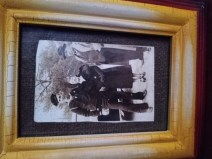
Uncle Karl (1922-1942) and my grandparents
Today is Memorial Day. I thought it appropriate to offer thanks to those men and women who have made the ultimate sacrifice in the service of their country. Among them, my Uncle Karl who died in 1942 on the USS Quincy in the Battle for Savo Island, and my brother, his namesake, who died in 2021. His death attributed to his service in Viet Nam.
Memorial Day was a big deal when I was growing up. My town was small, a mile deep and a half mile wide. Each Memorial Day it fielded a parade that wound through the town to Memorial Park. At the Park, the Commander of the local American Legion Post read the names of the fallen, followed by a twenty-one-gun salute, and a wreath presentation ceremony. It was a solemn occasion and a celebration of thanks.
The year I was selected to place the wreath on our veterans’ memorial an old man, wearing the uniform of a United States Marine, stepped out of the crowd. He took my arm and led me to the memorial. Together we placed the wreath at the base of the marble column. I thought he stumbled when he half knelt at the foot of the monument and let his fingers rest on a name. Before I could react with Girl Scout first aid, he stood, turned, snapped to attention, and saluted the flag that flew next to the memorial.
The man was Mr. Treple. He had served proudly in WWI as a Marine and lost his only son,
also a Marine, to WWII. His boy child buried in an unmarked grave somewhere in Europe then still listed as missing in action and presumed dead. Mr. Treple died later that year but his actions on that long-ago Memorial Day are with me still.

Karl T. Hoyle (1943-2021)
Freedom isn’t free. It is bought and paid for by those who made the ultimate sacrifice and by the families who love them.
Lea Wait's Blog
- Lea Wait's profile
- 509 followers



